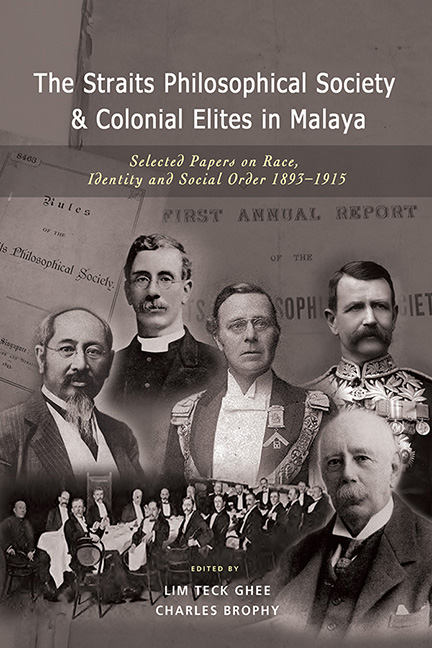 The Straits Philosophical Society and Colonial Elites in Malaya
The Straits Philosophical Society and Colonial Elites in Malaya 9 - On the Contagious Diseases Acts
Published online by Cambridge University Press: 09 January 2024
Summary
Editors’ Note
“On the Contagious Diseases Acts” was one of the earliest contributions to the Society. The paper was written by David J. Galloway, a doctor and founder in 1890 of the Straits Medical Association. The paper would be responded to by G.D. Haviland, who, between 1891 and 1893, had served as a medical officer in Sarawak and a Curator of the Sarawak Museum in Kuching before arriving in Singapore as the Raffles Library and Museum Curator.
The background to the discussion was the Contagious Diseases Ordinance (CDO), a public health ordinance which regulated the sex trade in the Straits Settlements through a system of registration and inspection. This gave the police powers to detain sex workers in “lock hospitals” and subjected them to compulsory medical examination. The passage of the CDO had precipitated objections, both in Britain and in the colony from a number of social groups including moral reformers, missionaries, feminists and civil libertarians, who successfully lobbied the Liberal government of Britain to repeal the Ordinances in 1886.
In Singapore the CDO was introduced to protect British sailors and soldiers, not the population of the colony. Through the influence of the Chinese Protector Pickering, the CDO was expanded from its initial focus on “all nationality” women (Europeans, Indians and Japanese sex workers) to also focus on Chinese sex workers, who were to be examined on a monthly basis. Soon after, the CDO was placed under the Chinese Protectorate and contagious disease was conceptualized as a “Chinese problem”, defined by the significant demographic disparity between Chinese men and women in the colony. The repeal of the Ordinances in Britain placed the question of repeal on the legislative table in Singapore and led to debates within the colony between moral reformers and the colonial government. The former argued that, due to the prevalence of sexual diseases in Singapore, and the colony’s demographic disparity, an exception should be made and the CDO should be retained. Rejecting this, the Colonial Office ordered its repeal in 1887.
By the time that Galloway was addressing the matter to the Society, the Act had already been repealed for six years.
- Type
- Chapter
- Information
- The Straits Philosophical Society and Colonial Elites in MalayaSelected Papers on Race, Identity and Social Order 1893-1915, pp. 127 - 147Publisher: ISEAS–Yusof Ishak InstitutePrint publication year: 2023
